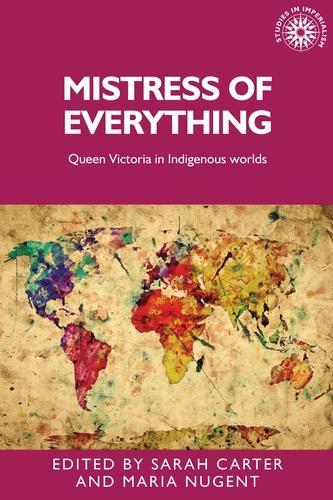
Mistress of Everything: Queen Victoria in Indigenous Worlds
(Hardback)
Available Formats
Publishing Details
Mistress of Everything: Queen Victoria in Indigenous Worlds
By (Author) Sarah Carter
Edited by Maria Nugent
Manchester University Press
Manchester University Press
21st June 2016
United Kingdom
Classifications
Physical Properties
Hardback
280
Width 156mm, Height 234mm
Description
Mistress of everything examines how indigenous people across Britain's settler colonies engaged with Queen Victoria in their lives and predicaments, incorporated her into their political repertoires, and implicated her as they sought redress for the effects of imperial expansion during her long reign. It draws together empirically rich studies from Canada, Australia, New Zealand and Southern Africa, to provide scope for comparative and transnational analysis. The book includes chapters on a Maori visit to Queen Victoria in 1863, meetings between African leaders and the Queen's son Prince Alfred in 1860, gift-giving in the Queen's name on colonial frontiers in Canada and Australia, and Maori women's references to Queen Victoria in support of their own chiefly status and rights. The collection offers an innovative approach to interpreting and including indigenous perspectives within broader histories of British imperialism and settler colonialism. -- .
Reviews
Non-European peoples had reason and opportunity to learn the structure and disposition of the authorities that colonised them. Under British rule, they had time to get to know Queen Victoria, for she reigned from 1837 to 1901. Queen Victoria was not only an individual but a synonym for the Crown, for the British government and for the Empire (p.2). In Mistress ofEverything ten historians of British settler-colonial southern Africa, Australia, Canada and New Zealand richly illustrate how Victoria was known to the colonised.
Tim Rowse, Western Sydney University, Oceania
In its innovations and the depth of each of its contributions, this volume will act asa beginning. The editors have brought together an exciting collection of papers,which separately and together will stimulate many more conversations acrossnational and racial borders. They have taken us outside the ghetto of settlercolonialism to explore colonised peoples responses to their colonisation farmore widely and realistically than is often possible. We are in a far strongerposition to see the ways empires and sovereigns make their claims, how genderand power intersect and how colonised peoples challenges to those claims havetaken shape in a range of conditions and different media, all of which havechanged over time.
Heather Goodall, University of Technology Sydney, AboriginalHistory, Vol. 41, 2017
The editors have compiled a stimulating collection of studies that entice the reader with absorbing case studies from across the British Empire.
Aidan Jones, Kings College London, Royal Studies Journal
Author Bio
Sarah Carter is Professor and H. M. Tory Chair in the Department of History and Classics and the Faculty of Native Studies at the University of Alberta
Maria Nugent is Research Fellow at the Australian Centre for Indigenous History in the School of History at the Australian National University
